Have you ever wondered what time chickens go to bed? It might surprise you to learn that chickens have their own bedtime routine, just like we do.
Understanding when chickens go to bed isn’t just about their sleep habits. It’s also about their natural instincts and how they stay safe from nighttime predators. Here’s more about a chicken”s bedtime and why it varies throughout the year.
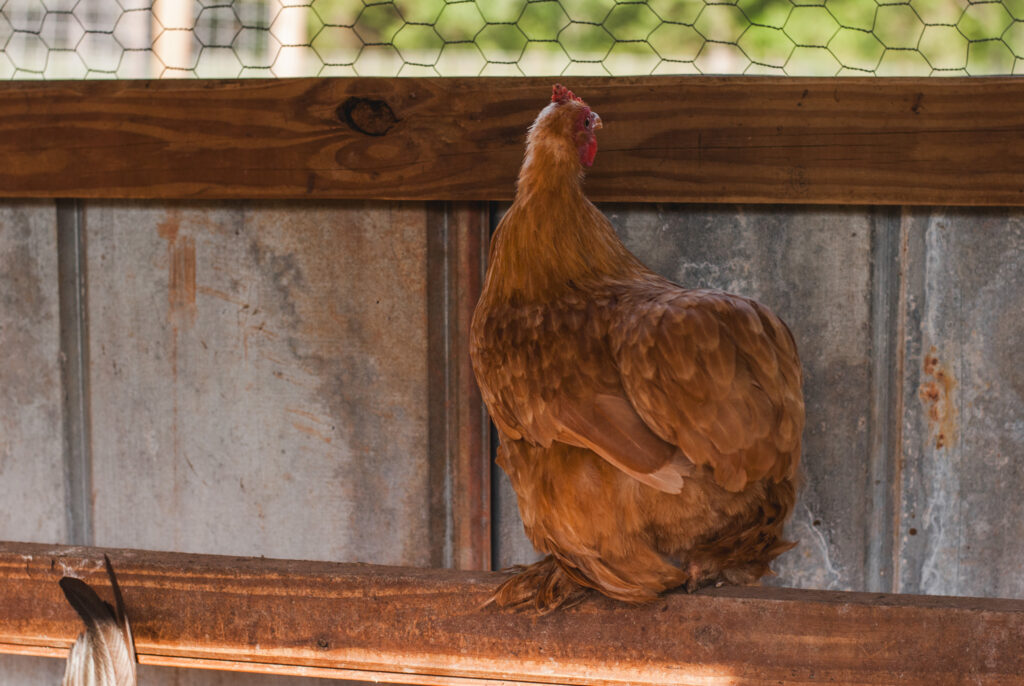
What Time Do Chickens Go To Bed?
Chickens usually go to bed at dusk, which means right around the time the sun sets. This time can change depending on the season.
In the summer, when the days are longer, chickens might stay up a little later because the sun sets later. In the winter, when the days are shorter, they’ll head to bed earlier because it gets dark sooner.
Chickens are pretty good at sticking to a bedtime that’s tied to how much daylight there is each day.
Chickens will lay more eggs when the days are longer. This is why people will sometimes put a light in the coop during winter. More light tricks chickens into laying more eggs.
What Time Do Chickens Wake Up?
Chickens usually wake up with the sun, and just like their bedtime, this changes with the seasons. In the summer, when the sun rises early, they wake up early. In the winter, when the sun takes its time to come up, they sleep in a little bit longer.
Roosters have a natural instinct to sense light before humans even notice the sun rising. It’s like they have a built-in alarm clock. They start crowing to let everyone know it’s time to get up. So, when you hear a rooster crowing, it’s a good sign the sun is about to rise.
In the chicken coop, their sleep pattern is pretty consistent. They go to bed at dusk and wake up with the sun. This pattern helps them stay healthy and happy.
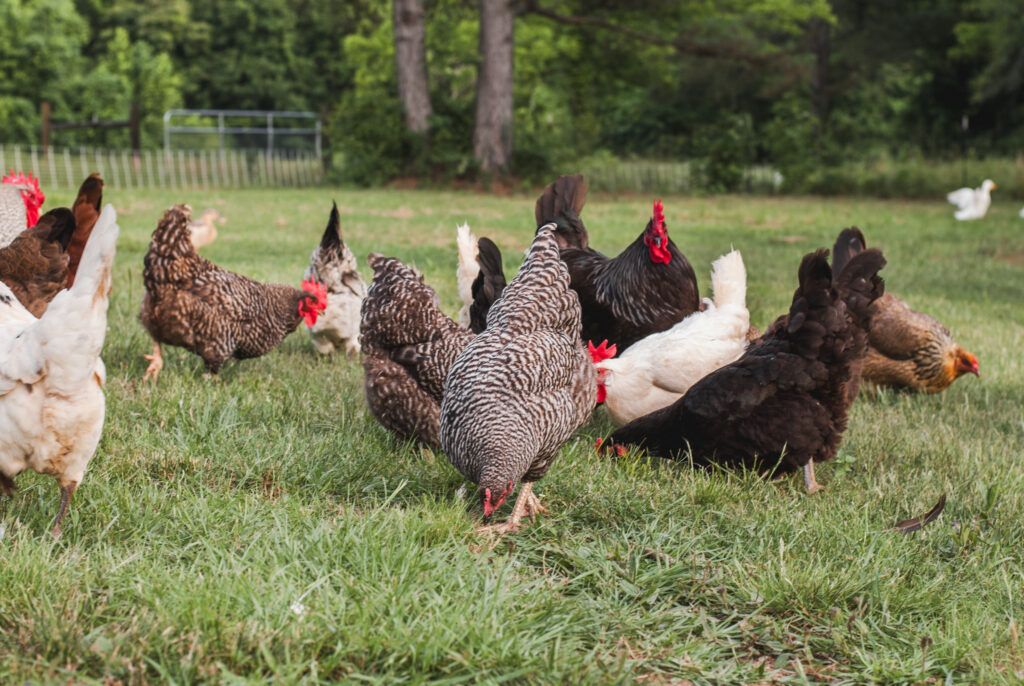
Chicken Sleep Cycles
Chickens have a pretty interesting sleep cycle. Just like humans, they go through different stages of sleep, and yes, they actually dream. When they sleep, their brains get busy, and they have little chicken dreams.
In the chicken coop, chickens like to sleep on roosting bars. These are like little perches where they can sit and feel safe. They prefer to sleep in a high spot because it makes them feel secure and protected from any predators.
Chickens usually sleep in a position where they tuck their heads under their wings. It looks cozy and helps them stay warm. They also like to sleep close together, which makes them feel safe.
Another important thing in the chicken coop is the pecking order. This is like a ranking system among the chickens. The top chickens in the pecking order get the best spots on the roosting bars, while the lower-ranked ones have to find a spot wherever they can.
This pecking order helps keep everything organized in the coop and makes sure everyone has a place to sleep. I love the chicken drama that happens when it’s bedtime in the coop.
A Safe Space For Chickens To Sleep
Chickens are creatures of habit and will return to their coop every evening when it’s bed time. However, to keep chickens safe in their coop, there are a few things you have to take care of.
First, the coop should be ventilated but draft-free. Good ventilation keeps the air fresh and prevents the buildup of moisture and ammonia, which can be bad for the chickens. However, drafts can make chickens cold, especially in the colder months, so it’s important to block those.
The coop also needs to be predator-proof. The best way to do this is to use hardware cloth, which is a strong wire mesh, instead of chicken wire. Hardware cloth is much tougher and can keep out predators like raccoons and foxes.
One key area to protect is the floor of the coop. Burying the hardware cloth around the edges of the coop to prevent animals from digging underneath is a good idea. Also, make sure there are no gaps or holes around the coop floor where night time visitors could sneak in.
Inside the coop, you need proper roosts where chickens can sleep safely. These should be sturdy and high enough off the ground to keep them away from any danger. Check out the chicken roosting ladder I use in my coop.
It’s also important to have enough space in the coop for the number of chickens you have. Crowded conditions can lead to stress and illness.
Nesting boxes are also a must for a chicken coop. Chickens are notorious for sleeping in the highest place, so providing them with nesting boxes that are lower than their roost will help to prevent them from roosting in them.
It will also give a broody hen easier access to their chicks should they hatch them in the coop.
A safe chicken coop should be ventilated, draft-free, and predator-proof. Using hardware cloth, securing the floor, providing proper roosts, and making sure there’s enough space for all the chickens are the best ways to keep them safe.
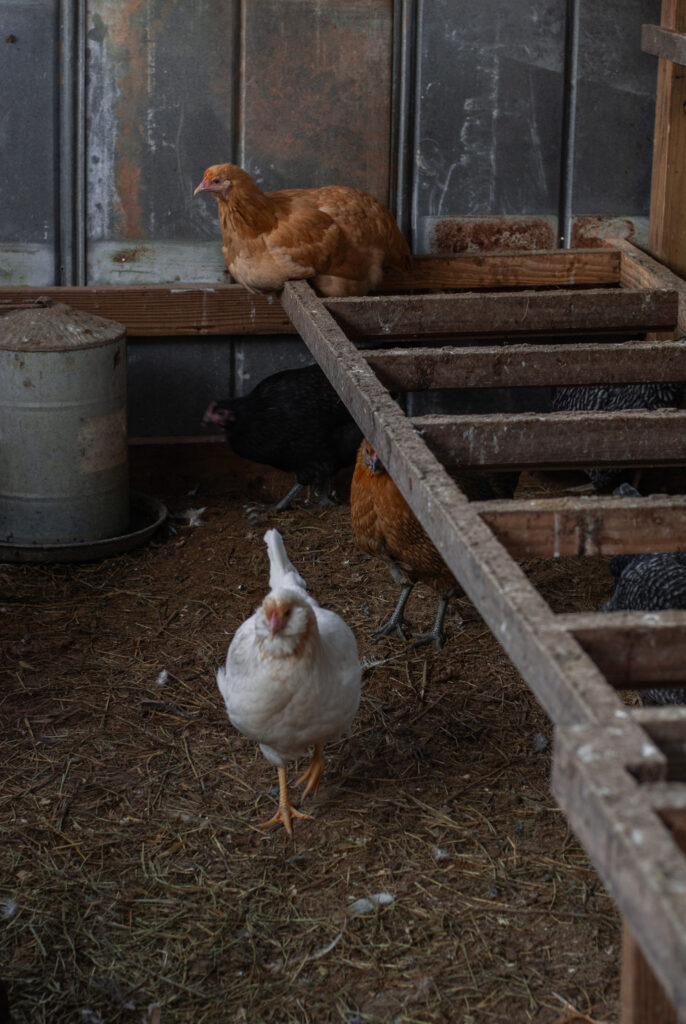
*This post may contain affiliate links which means I make a small commission at no extra cost to you. Read my full disclosure here.*
Training Chickens To Go To Bed
Training chickens to go to bed is pretty easy for chicken owners because they have a natural instinct to return to the coop at night. Even free range birds will return night after night.
However, they do need to learn where their safe place is. For new chickens or young birds, it helps to keep them in the coop for a few days when you first get them. This way, they understand that the coop is their home.
On their first night out of the coop, you can let them explore but keep an eye on them. When it gets to the late afternoon, start guiding them back to the coop. You might have to gently herd them inside, but they’ll catch on quickly.
If you have an automatic door on your coop, it’s important to set it to close at the correct time, just after dusk. This way, the chickens have time to come back inside before it shuts. After a few days of this routine, they’ll know exactly where to go when it starts to get dark.
While there isn’t much training needed, showing your chickens where their safe place is and helping them get back to the coop in the late afternoon for the first few days will get them into the habit. The training process doesn’t take much time and they’ll soon head to bed all on their own.
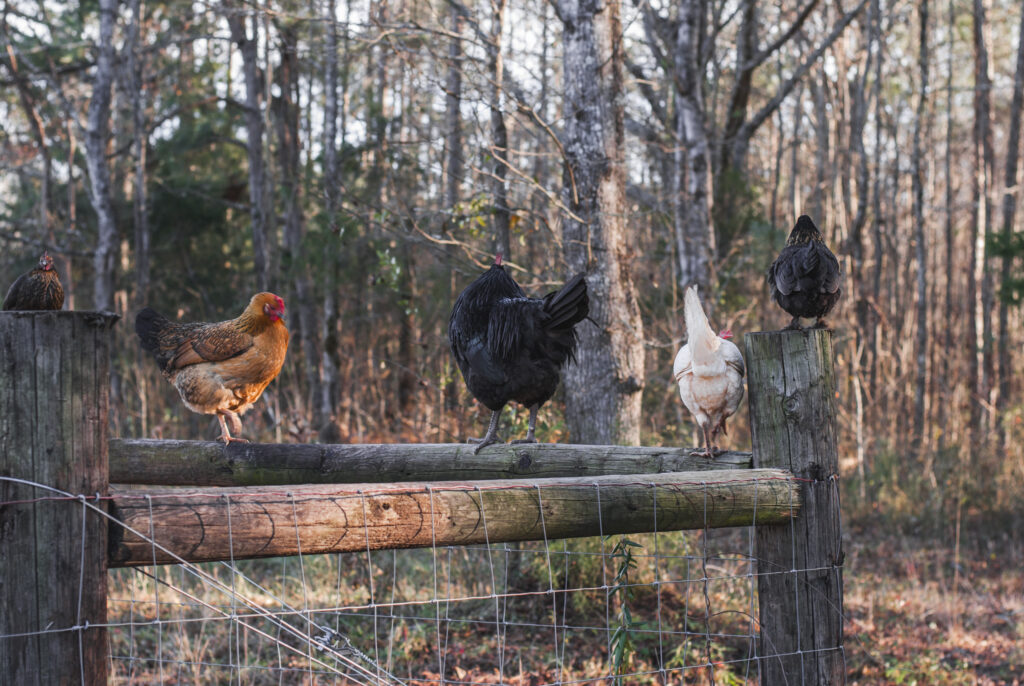
Where Do Chickens Naturally Sleep Without a Coop?
If chickens didn’t have a coop, they would naturally look for a high place to sleep at night. They might roost in the high rafters of a barn or even up in trees. These high spots help keep them safe from nocturnal predators like raccoons and foxes.
Chickens have a natural instinct to find a safe, elevated spot to sleep. This keeps them out of reach from most ground predators. When moving chickens to a new location, they might have a hard time finding the best place to sleep at first, but they quickly adapt to finding high places to roost.
To mimic this perfect environment in a coop, you can install roosting bars. These should be placed high enough off the ground to give the chickens that same feeling of security. Use the best materials, like sturdy wood or metal, to make sure the roosting bars are strong and comfortable.
Providing a high place in the coop, like roosting bars, helps the chickens feel safe from nocturnal predators. By setting up these high spots, you make the coop feel more like their natural sleeping environment, keeping them happy and secure. Learn more about the origins of chickens.
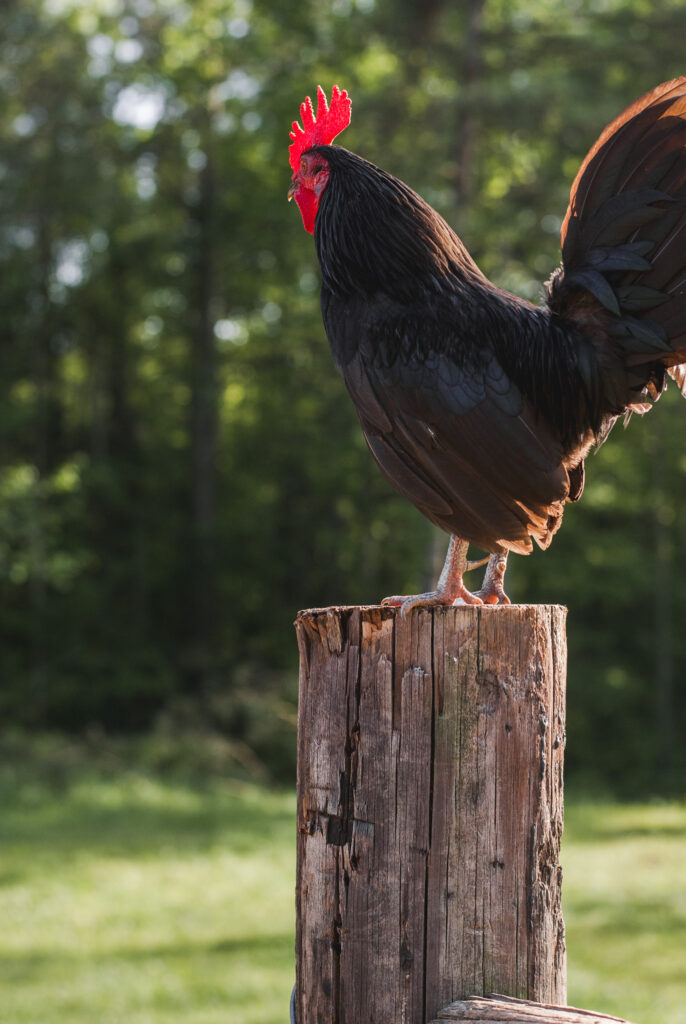
What Time Do Baby Chicks Go To Bed?
When baby chicks are young, they sleep differently than older chickens. You’ll often find them cuddled together on the floor of their brooder instead of roosting like adult chickens.
They don’t need roosts when they’re little because they haven’t learned that behavior yet. Baby chicks have the natural instinct to stay close to warmth and safety. Most chicken keepers provide them with a heat lamp they can huddle under.
If baby chicks are raised by a mother hen, they’ll follow her lead. She’ll teach them where to sleep, usually on the ground of the coop or nest, surrounded by softwood shavings or straw for comfort. Mother hens keep their chicks warm and protected during the night, which helps them feel safe enough to sleep.
Baby chicks’ sleeping habits are more about staying close to warmth and safety, whether under a heat lamp, or with their mother hen. As they grow older, they’ll learn to roost like adult chickens, but when they’re young, they prefer to stay low to the ground where they feel secure.
Circumstances That Will Disrupt a Chicken’s Sleep Schedule
Sometimes, chickens might not go to bed at the normal time, especially if there are special situations. For example, on rainy or cloudy days, chickens might go in earlier because it’s darker earlier. They rely on natural light to know when it’s the right time to head to bed.
If a chicken feels unsafe in their coop, they might also delay going to bed. A coop that isn’t secure can make them nervous, and they might wait until they feel it’s safe enough to join the rest of the flock inside.
So, while chickens usually know the correct time to go to bed, factors like weather and feeling safe can affect when they decide it’s the right time to settle in for the night.
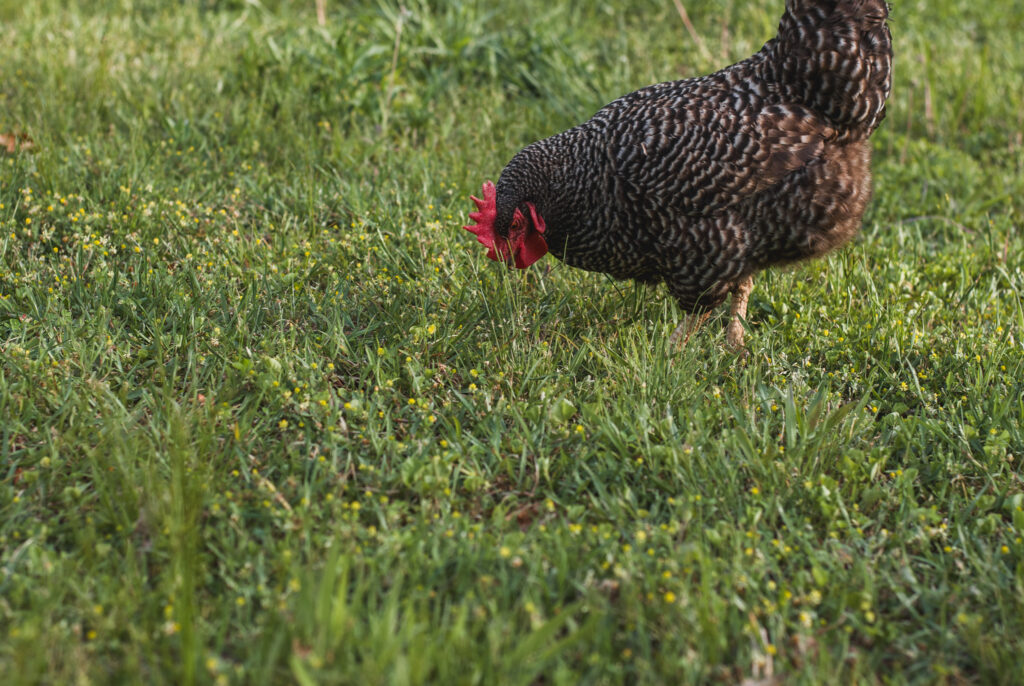
Chicken Sleeping FAQs
Why do chickens go to bed so early?
Chickens go to bed early because they don’t see well in the dark. Going to bed at dusk keeps them safe from predators.
How do I make sure my chickens go to bed on time?
Keep an eye on them in the late afternoon and guide them to the coop if needed. An automatic door that closes at dusk can also help.
Will chickens stay up later in the summer?
Yes, since the days are longer in the summer, chickens will stay up a bit later because the sun sets later.
What if my chickens don’t go to bed at dusk?
If they don’t go to bed at dusk, you might need to gently guide them into the coop until they get used to the routine.
Is it normal for chickens to wake up early?
Yes, chickens wake up with the sunrise. Roosters often crow before the sun is fully up because they can sense the light early.
How do chickens keep themselves safe from predators at night?
Chickens naturally roost in high places to stay out of reach from ground predators. In the coop, you can mimic this by providing high roosting bars.
What are the best materials for roosting bars?
Sturdy wood or metal are the best materials for roosting bars. They need to be strong and comfortable for the chickens to perch on.
What Time Do Chickens Go To Bed? Final Thoughts
The time chickens go to bed varies throughout the year because it depends on when the sun sets.
In the summer, they stay up a bit later, and in the winter, they go to bed earlier. Chickens have a natural instinct to head to their coop at dusk, which helps keep them safe from predators.
By giving them a secure coop and a little of guidance at first, your chickens will quickly learn their bedtime routine. Whether it’s a long summer evening or a short winter day, your chickens will know when it’s time to head to bed.
If you enjoyed this chicken article, please share it! Thanks for visiting my farm!
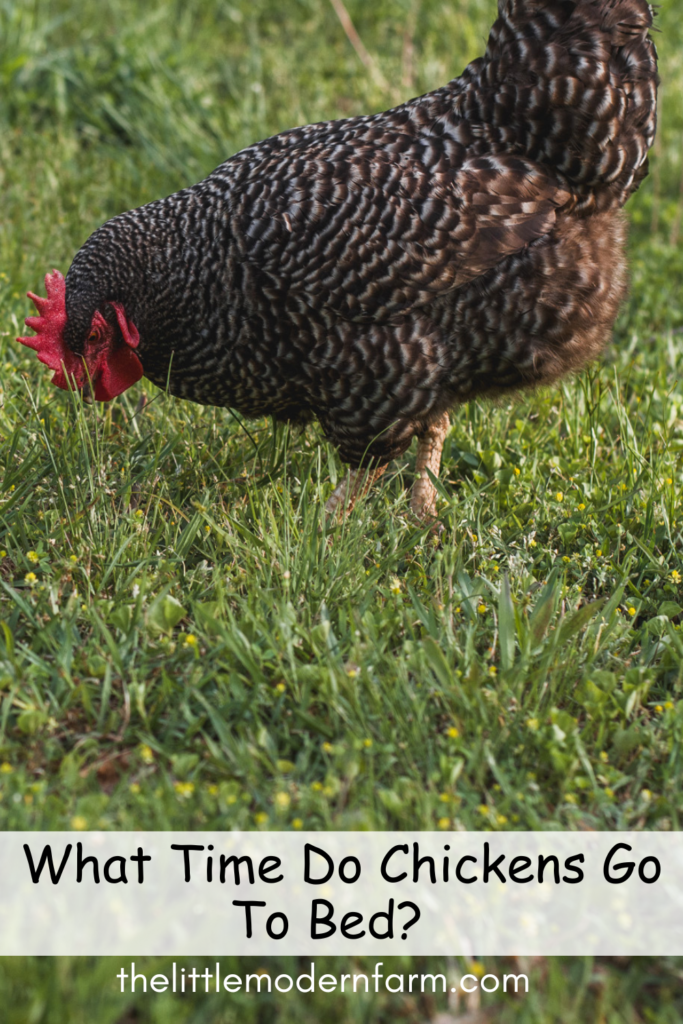
More From The Farm
How do chickens clean themselves? This is a common question among new chicken keepers. Owning chickens is anything but boring, and chicken bathing adds to the quirkiness of their personalities. Let’s take a closer look at how these funny birds take a bath.
[…] What Time Do Chickens Go To Bed? Roosting Habits […]